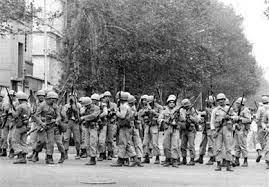How the Tabriz Army Barracks Were Seized
Translated by: Kianoush Borzouei
2024-09-01
There was a major from the Army’s logistics department who had previously pledged allegiance to Mr. Ghazi. Mr. Ghazi told the major: "Stay inside the barracks, and when necessary, I will instruct you on what to do." Although I wasn’t entirely convinced, he had a lot of faith. Later, I realized that he was a devout and courageous officer.
The major said: "Beidabadi is stalling and wasting time. There’s only one way. You must gather your courage and seize the barracks."
I asked: "How?"
He responded: "How do you usually commute to the barracks? This time, I’ll come with you." Usually, I would go with Mr. Ghazi’s son.
The major explained the plan like this: "When you first enter, tell him to hand over the weapons. Once he puts the guns on the table, grab them and give them to me, since I’m the military man here. Then, tell him to hand over his pistol as well. He might comply, or he might refuse, possibly even shooting one of you. In that case, I’ll fire back with my Uzi. He may shoot one, but I will shoot four times. However, there’s a chance he might hit one or two of you. Are you prepared?"
I replied: "Yes."
It was decided that Mr. Ghazi Tabatabaei would provide us with a handwritten note to present to Beidabadi so that we could take control of the barracks. (Unfortunately, that note was later lost.)
Mr. Ghazi Tabatabaei told me: "You shouldn’t go. You’re young; it would be a waste."
I responded: "Haj Agha, it’s better if they kill me. It would serve as a pretext for taking the barracks."
He said: "I’ve lived my life; let me go myself."
I replied: "Haj Agha, if something happens to you, no one will be able to lead the revolution in Tabriz. The central leadership of the revolution here rests in your hands. No one will listen to me."
After an hour of discussion, he agreed that the two of us should go.

Right there, at Haj Agha’s house, we performed the ritual ablution for martyrdom. Accompanied by the major, we went to the barracks in his Benz 190. The gatekeeper granted us entry. We entered.
Beidabadi said: "Please, come in." We sat down. We told him: "Order your adjutant to hand over his weapon." He asked: "But why?"
We responded: "You heard us." I placed Ghazi's note on the table.
He said: "I’m at your service. The barracks are at your disposal."
His face had turned pale. He called the adjutant and said: "Son, hand over your weapon." The adjutant cocked his gun. We quietly murmured "La ilaha illallah."
Suddenly, Beidabadi turned and said: "This is an order." The adjutant placed the gun on the table. I picked it up and handed it to the major.
The major then told Beidabadi: "Hand over your pistol." Suddenly, Beidabadi started trembling, and his speech faltered. He handed over the pistol, and we removed the bullets.
A military personnel carrier was waiting behind the library. We exited through the back door and took Beidabadi to Mr. Ghazi Tabatabaei’s house, where we detained him on the upper floor.
Afterward, Mr. Ghazi Tabatabaei's son and I took command of the barracks. From there, we called Dr. Rajaee Khorasani and Dr. Karani. They came, and we coordinated plans, bringing in 300 students to assist in securing the barracks.
The protection of Mr. Ghazi's house was also handed over to the Air Force personnel.
Later that afternoon, we held a meeting at the barracks and temporarily appointed one of the senior officers as our deputy to handle military operations. Since I wasn’t familiar with military ranks, the major, who understood military matters, said: "If you want to succeed in the army, you must put the highest-ranking officer in charge." Hence, we introduced General Arzidi, who was Beidabadi's deputy and an elderly, well-established figure, at the morning assembly. Most of the military personnel and SAVAK agents had already fled. When the soldiers went to the city for tasks, they wore civilian clothes and changed back into military uniforms upon returning to the barracks.
Number of Visits: 1786
http://oral-history.ir/?page=post&id=12069
